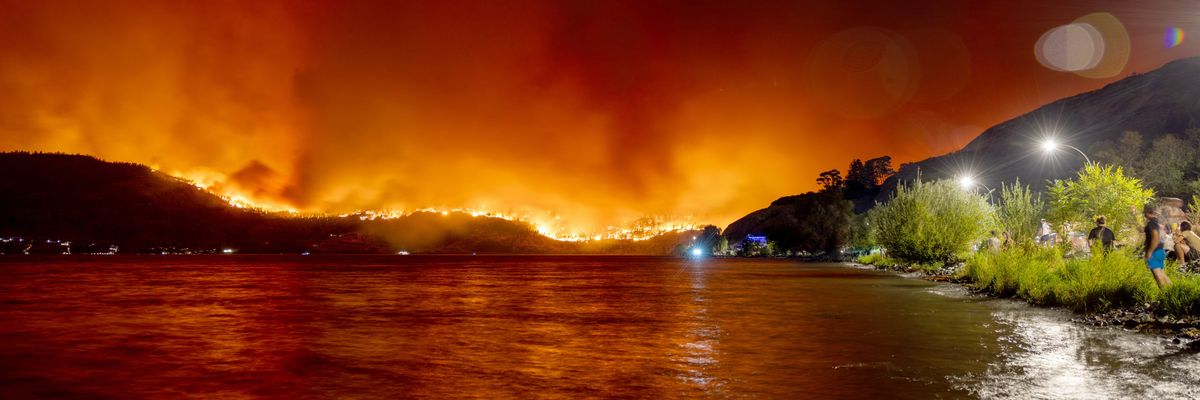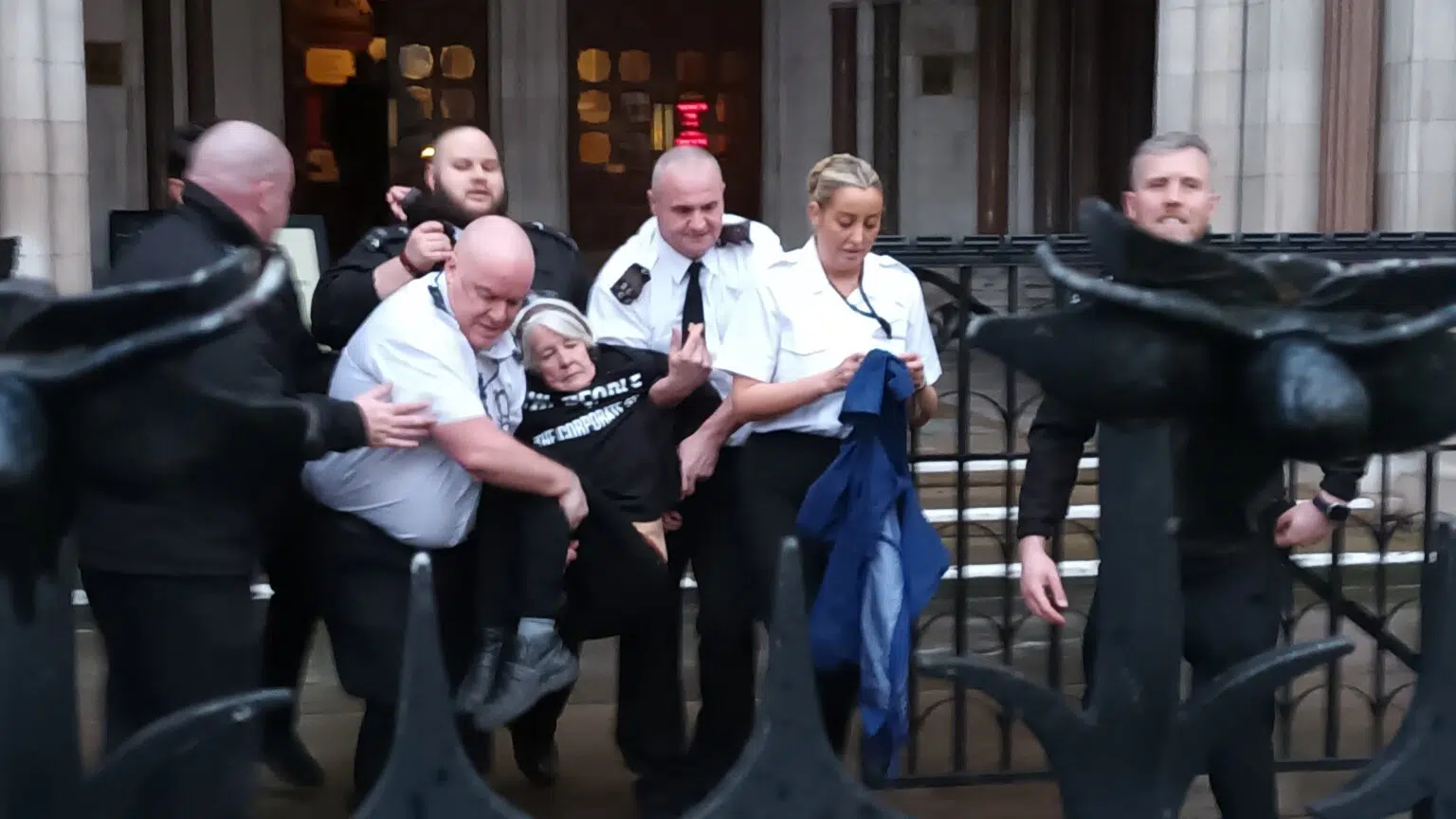‘Sirens Are Blaring’: WMO Says 2023 Shattered Key Climate Metrics
Original article by OLIVIA ROSANE republished from Common Dreams under Creative Commons (CC BY-NC-ND 3.0).

(Photo: Darren Hull/AFP via Getty Images)
“Fossil fuel pollution is sending climate chaos off the charts,” U.N. Secretary-General António Guterres said.
Last year broke records for several key climate indicators, including surface temperatures, ocean heat, sea-level rise, and the loss of Antarctic sea ice, the World Meteorological Organization found in its State of the Global Climate 2023 report, released Tuesday.
The agency confirmed that 2023 was the hottest year on record and said it gave an “ominous” new meaning to the phrase “off the charts.”
“Earth is issuing a distress call,” United Nations Secretary-General António Guterres said in a video statement. “The latest State of the Global Climate report shows a planet on the brink. Fossil fuel pollution is sending climate chaos off the charts. Sirens are blaring across all major indicators.”
“The climate crisis is THE defining challenge that humanity faces and is closely intertwined with the inequality crisis.”
2023 saw an average global near-surface temperature of 1.45°C, the report found, making 2023 the hottest on record and the cap on the warmest 10-year period on record.
“Never have we been so close—albeit on a temporary basis at the moment—to the 1.5°C lower limit of the Paris agreement on climate change,” WMO Secretary-General Celeste Saulo said in a statement. “The WMO community is sounding the red alert to the world.”
The European Union’s Copernicus Climate Change Service and European Center for Medium-Range Weather Forecasts had found separately that January 2024 capped a 12-month period that exceeded the 1.5°C target for the first time.
2023 was also a particularly alarming year for ocean heat, with nearly a third of the ocean in the midst of a marine heatwave at any time during the year. Global sea-surface temperatures reached record heights for April and every month after, with July, August, and September especially hot. Ocean heat content also broke records, and more than 90% of the ocean experienced a heatwave for at least a portion of the year.
The world’s glaciers and sea ice did not fare any better. Glaciers lost the most ice in any year since record-keeping began in 1950, and Antarctica’s sea-ice extent at the end of winter smashed the previous record by 1 million square kilometers.
“Because of burning fossil fuels, which leads to CO2-induced global heating, we have impacted the polar regions to such a degree that 2023 saw by far the greatest loss of sea ice in the Antarctic and of land ice in Greenland,” University of Exeter polar expert Martin Siegert told Common Dreams. “The world will feel the detrimental effects now and into the future because the changes observed will lead to ‘feedback’ processes encouraging further change.”
“Our only response must be to stop burning fossil fuels so that the damage can be limited,” Siegert added. “That is our best and only option.”
2023 also saw record sea-level rise and ocean acidification.
“Climate change is about much more than temperatures,” Saulo said. “What we witnessed in 2023, especially with the unprecedented ocean warmth, glacier retreat, and Antarctic sea ice loss, is cause for particular concern.”
Records were broken too for the main cause of all this warming and melting—the levels of greenhouse gasses in the atmosphere. Carbon dioxide, methane, and nitrous oxide all reached record levels in 2022, and data indicates that the atmospheric concentrations of all three continued to rise in 2023, with carbon dioxide levels 50% higher than before the industrial revolution.
The report also considered the impacts of global heating on extreme weather events: 2023 saw several especially devastating climate-fueled disasters, including lethal flooding from Cyclone Daniel in Libya; Tropical Cyclone Mocha, which displaced 1.7 million people in the region around the Bay of Bengal; an extreme heatwave in southern Europe and North Africa; a record wildfire season in Canada that smothered several North American cities in heavy smoke; and the deadliest U.S. wildfire in more than 100 years in Hawaii.
In addition to claiming lives and forcing people from their homes, these disasters have several other impacts on peoples’ well-being. For example, the report noted that the number of people suffering from acute food insecurity had shot up to 333 million in 2023, more than two times the 149 million before the pandemic. While the root causes of this are war and conflict, economic downturns, and high food prices, extreme weather events can make the situation worse. When Cyclone Freddy, one of the longest-lasting cyclones ever, struck Madagascar, Mozambique, and Malawi in February, it flooded vast swaths of agricultural fields and damaged crops in other ways.
“The climate crisis is THE defining challenge that humanity faces and is closely intertwined with the inequality crisis—as witnessed by growing food insecurity and population displacement, and biodiversity loss,” Saulo said.
Guterres, meanwhile, said the impact of extreme weather on sustainable development was “devastating.”
“Every fraction of a degree of global heating impacts the future of life on Earth,” he said.
There was some positive news in the report, mainly that renewable energy increased new capacity by nearly 50% in 2023 compared with 2022, the highest rate of increase in 20 years. Global climate finance nearly doubled from 2019-2020 to almost $1.3 trillion, but this was still only 1% of global gross domestic product.
To have a shot at limiting warming to 1.5°C, finance needs to increase by nearly $9 trillion by 2030 and another $10 trillion by 2050, but this is much lower than the estimated cost of doing nothing, which would be $1,266 trillion from 2025-2100, though the WMO said this was likely a “dramatic underestimate.”
Guterres said it was still possible to limit long-term global temperature rise to 1.5°C, but it required swift action; leadership from the G20 nations toward a just energy transition; countries proposing 1.5°C-compliant climate plans by 2025; increased climate finance flows toward the developing world, including for adaptation and Loss and Damage; universal coverage by early warning systems by 2027; and “accelerating the inevitable end of the fossil fuel age.”
“There’s still time to throw out a lifeline to people and planet,” Guterres said, “but leaders must step up and act now.”
Original article by OLIVIA ROSANE republished from Common Dreams under Creative Commons (CC BY-NC-ND 3.0).
- Clean Energy Production Must Double By 2030 To Stave Off Catastrophe: WMO ›
- Global South Saw More Than 90% Of All Extreme Weather Deaths In Last 51 Years: UN Agency ›
- ‘Terrifying’: Tuesday Was Hottest Day Ever, Breaking Record Set Just 24 Hours Earlier ›
- ‘Absolutely Gobsmackingly Bananas’: Early Data Shows September 2023 Hottest On Record ›
- With Climate Indicators ‘Off The Charts,’ UN Chief Calls Policies Of Rich Nations A ‘Death Sentence’ ›
- WMO Climate Report Details ‘Deafening Cacophony Of Broken Records’ ›




